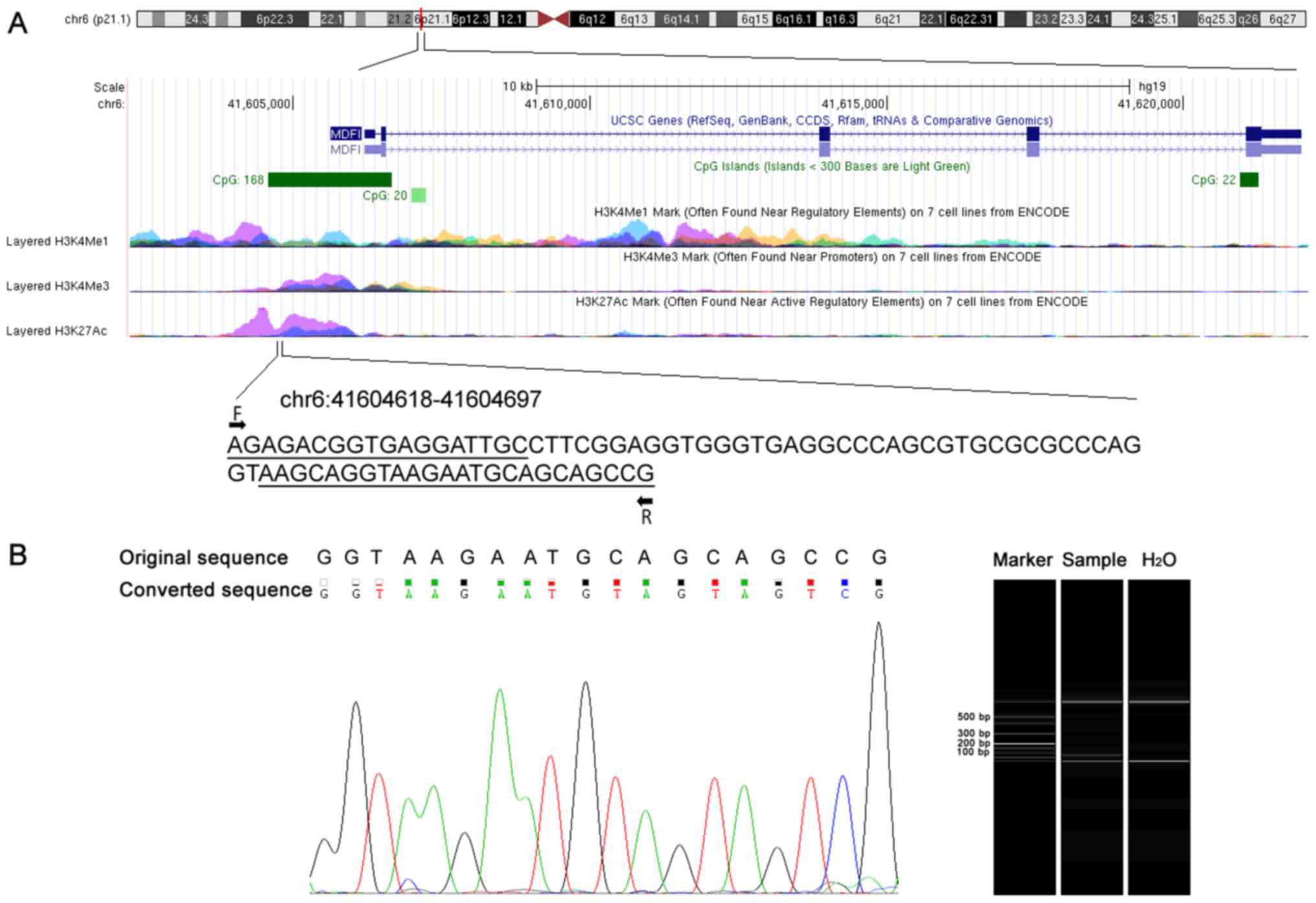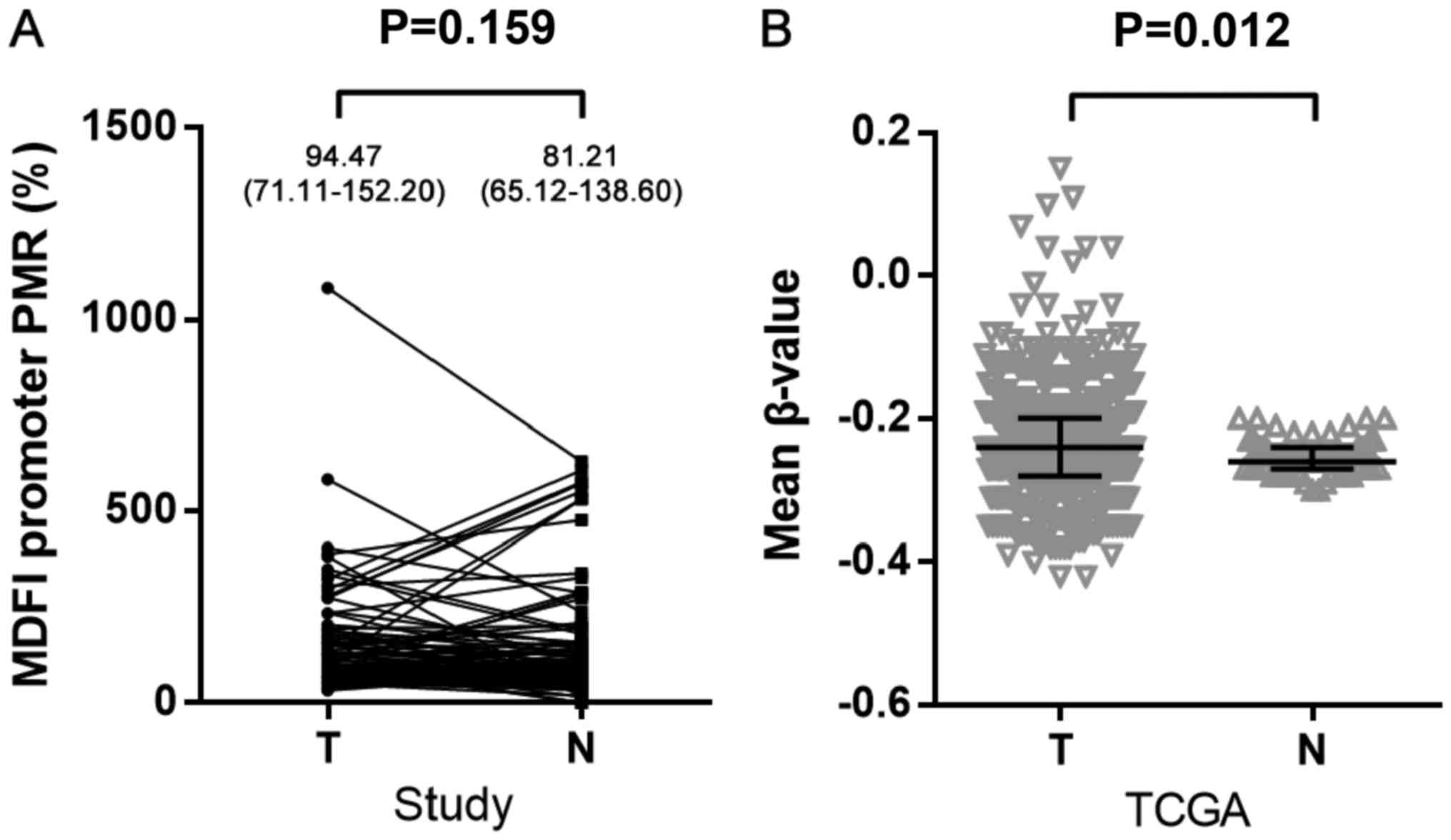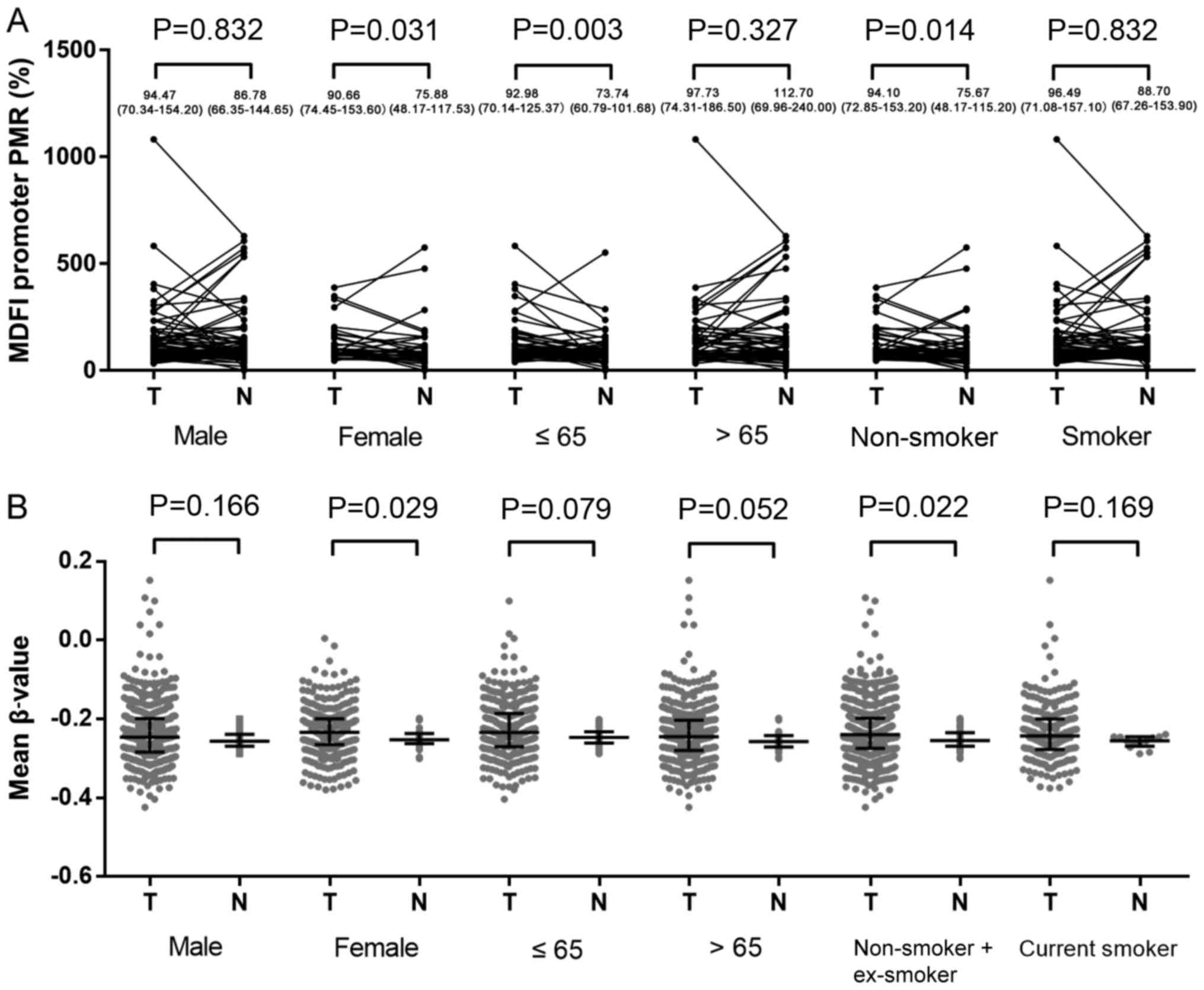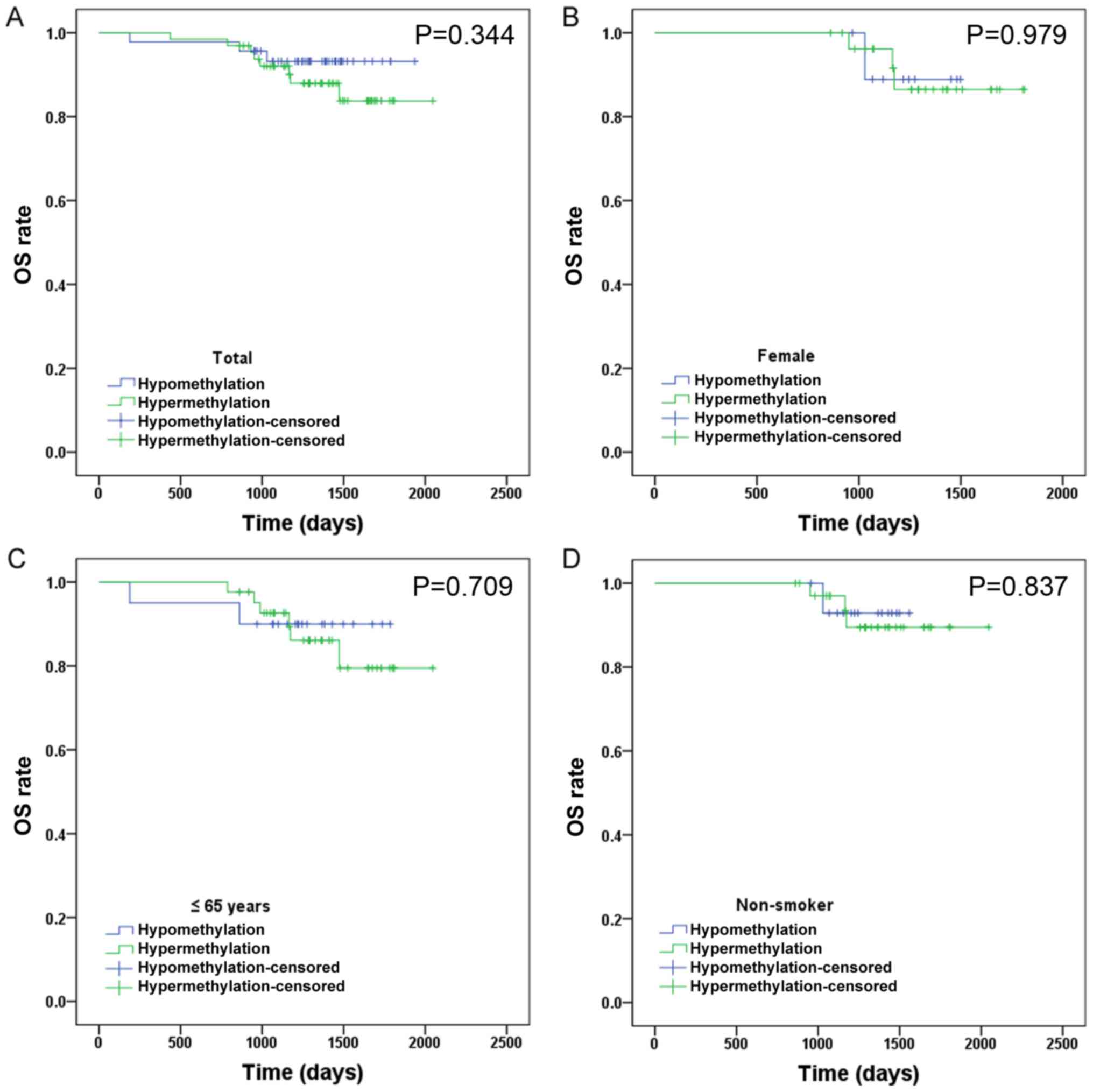|
1
|
Han Y, Shi K, Zhou SJ, Yu DP and Liu ZD:
The clinicopathological significance of hMLH1 hypermethylation in
non-small-cell lung cancer: A meta-analysis and literature review.
Onco Targets Ther. 9:5081–5090. 2016. View Article : Google Scholar : PubMed/NCBI
|
|
2
|
Drzewiecka H, Gałęcki B,
Jarmołowska-Jurczyszyn D, Kluk A, Dyszkiewicz W and Jagodziński PP:
Decreased expression of connective tissue growth factor in
non-small cell lung cancer is associated with clinicopathological
variables and can be restored by epigenetic modifiers. J Cancer Res
Clin Oncol. 142:1927–1946. 2016. View Article : Google Scholar : PubMed/NCBI
|
|
3
|
Devarakonda S, Morgensztern D and Govindan
R: Genomic alterations in lung adenocarcinoma. Lancet Oncol.
16:e342–e351. 2015. View Article : Google Scholar : PubMed/NCBI
|
|
4
|
Shackelford RE, Vora M, Mayhall K and
Cotelingam J: ALK-rearrangements and testing methods in non-small
cell lung cancer: A review. Genes Cancer. 5:1–14. 2014.PubMed/NCBI
|
|
5
|
Travis WD: Pathology of lung cancer. Clin
Chest Med. 32:669–692. 2011. View Article : Google Scholar : PubMed/NCBI
|
|
6
|
Broodman I, VanDuijn MM, Stingl C, Dekker
LJ, Germenis AE, de Koning HJ, van Klaveren RJ, Aerts JG, Lindemans
J and Luider TM: Survivin autoantibodies are not elevated in lung
cancer when assayed controlling for specificity and smoking status.
Cancer Immunol Res. 4:165–172. 2016. View Article : Google Scholar : PubMed/NCBI
|
|
7
|
Tsai MF, Wang CC and Chen JJ: Tumour
suppressor HLJ1: A potential diagnostic, preventive and therapeutic
target in non-small cell lung cancer. World J Clin Oncol.
5:865–873. 2014. View Article : Google Scholar : PubMed/NCBI
|
|
8
|
Pérez-Ramírez C, Cañadas-Garre M, Robles
AI, Molina MÁ, Faus-Dáder MJ and Calleja-Hernández MA: Liquid
biopsy in early stage lung cancer. Transl Lung Cancer Res.
5:517–524. 2016. View Article : Google Scholar : PubMed/NCBI
|
|
9
|
Shien K, Papadimitrakopoulou VA and
Wistuba II: Predictive biomarkers of response to PD-1/PD-L1 immune
checkpoint inhibitors in non-small cell lung cancer. Lung Cancer.
99:79–87. 2016. View Article : Google Scholar : PubMed/NCBI
|
|
10
|
Ansari J, Shackelford RE and El-Osta H:
Epigenetics in non-small cell lung cancer: From basics to
therapeutics. Transl Lung Cancer Res. 5:155–171. 2016. View Article : Google Scholar : PubMed/NCBI
|
|
11
|
Song X, Shi K, Zhou SJ, Yu DP, Liu Z and
Han Y: Clinicopathological significance and a potential drugtarget
of RARβ in non-small-cell lung carcinoma: A meta-analysis and a
systematic review. Drug Des Devel Ther. 10:1345–1354.
2016.PubMed/NCBI
|
|
12
|
Zhang YA, Ma X, Sathe A, Fujimoto J,
Wistuba I, Lam S, Yatabe Y, Wang YW, Stastny V, Gao B, et al:
Validation of SCT methylation as a hallmark biomarker for lung
cancers. J Thorac Oncol. 11:346–360. 2016. View Article : Google Scholar : PubMed/NCBI
|
|
13
|
Fischer JR, Ohnmacht U, Rieger N, Zemaitis
M, Stoffregen C, Manegold C and Lahm H: Prognostic significance of
RASSF1A promoter methylation on survival of non-small cell lung
cancer patients treated with gemcitabine. Lung Cancer. 56:115–123.
2007. View Article : Google Scholar : PubMed/NCBI
|
|
14
|
Zöchbauer-Müller S, Fong KM, Virmani AK,
Geradts J, Gazdar AF and Minna JD: Aberrant promoter methylation of
multiple genes in non-small cell lung cancers. Cancer Res.
61:249–255. 2001.PubMed/NCBI
|
|
15
|
Kim DS, Cha SI, Lee JH, Lee YM, Choi JE,
Kim MJ, Lim JS, Lee EB, Kim CH, Park TI, et al: Aberrant DNA
methylation profiles of non-small cell lung cancers in a Korean
population. Lung Cancer. 58:1–6. 2007. View Article : Google Scholar : PubMed/NCBI
|
|
16
|
Tomizawa Y, Iijima H, Nomoto T, Iwasaki Y,
Otani Y, Tsuchiya S, Saito R, Dobashi K, Nakajima T and Mori M:
Clinicopathological significance of aberrant methylation of
RARbeta2 at 3p24, RASSF1A at 3p21.3, and FHIT at 3p14.2 in patients
with non-small cell lung cancer. Lung Cancer. 46:305–312. 2004.
View Article : Google Scholar : PubMed/NCBI
|
|
17
|
Heller G, Babinsky VN, Ziegler B,
Weinzierl M, Noll C, Altenberger C, Müllauer L, Dekan G, Grin Y,
Lang G, et al: Genome-wide CpG island methylation analyses in
non-small cell lung cancer patients. Carcinogenesis. 34:513–521.
2013. View Article : Google Scholar : PubMed/NCBI
|
|
18
|
Di Paolo A, Del Re M, Petrini I, Altavilla
G and Danesi R: Recent advances in epigenomics in NSCLC: Real-time
detection and therapeutic implications. Epigenomics. 8:1151–1167.
2016. View Article : Google Scholar : PubMed/NCBI
|
|
19
|
Egger G, Liang G, Aparicio A and Jones PA:
Epigenetics in human disease and prospects for epigenetic therapy.
Nature. 429:457–463. 2004. View Article : Google Scholar : PubMed/NCBI
|
|
20
|
Mehta A, Dobersch S, Romero-Olmedo AJ and
Barreto G: Epigenetics in lung cancer diagnosis and therapy. Cancer
Metastasis Rev. 34:229–241. 2015. View Article : Google Scholar : PubMed/NCBI
|
|
21
|
Kusano S, Shiimura Y and Eizuru Y: I-mfa
domain proteins specifically interact with SERTA domain proteins
and repress their transactivating functions. Biochimie.
93:1555–1564. 2011. View Article : Google Scholar : PubMed/NCBI
|
|
22
|
Kusano S and Eizuru Y: Human I-mfa domain
proteins specifically interact with KSHV LANA and affect its
regulation of Wnt signaling-dependent transcription. Biochem
Biophys Res Commun. 396:608–613. 2010. View Article : Google Scholar : PubMed/NCBI
|
|
23
|
Snider L, Thirlwell H, Miller JR, Moon RT,
Groudine M and Tapscott SJ: Inhibition of Tcf3 binding by I-mfa
domain proteins. Mol Cell Biol. 21:1866–1873. 2001. View Article : Google Scholar : PubMed/NCBI
|
|
24
|
Kisiel JB, Yab TC, Taylor WR, Chari ST,
Petersen GM, Mahoney DW and Ahlquist DA: Stool DNA testing for the
detection of pancreatic cancer: Assessment of methylation marker
candidates. Cancer. 118:2623–2631. 2012. View Article : Google Scholar : PubMed/NCBI
|
|
25
|
Omura N, Li CP, Li A, Hong SM, Walter K,
Jimeno A, Hidalgo M and Goggins M: Genome-wide profiling of
methylated promoters in pancreatic adenocarcinoma. Cancer Biol
Ther. 7:1146–1156. 2008. View Article : Google Scholar : PubMed/NCBI
|
|
26
|
Edge SB and Compton CC: The american joint
committee on cancer: The 7th edition of the AJCC cancer staging
manual and the future of TNM. Ann Surg Oncol. 17:1471–1474. 2010.
View Article : Google Scholar : PubMed/NCBI
|
|
27
|
Travis WD: The 2015 WHO classification of
lung tumors. Pathologe. 35 Suppl 2:S1882014. View Article : Google Scholar
|
|
28
|
Chen X, Yang Y, Liu J, Li B, Xu Y, Li C,
Xu Q, Liu G, Chen Y, Ying J and Duan S: NDRG4 hypermethylation is a
potential biomarker for diagnosis and prognosis of gastric cancer
in Chinese population. Oncotarget. 8:8105–8119. 2017.PubMed/NCBI
|
|
29
|
Kristensen LS, Mikeska T, Krypuy M and
Dobrovic A: Sensitive melting analysis after real time-methylation
specific PCR (SMART-MSP): High-throughput and probe-free
quantitative DNA methylation detection. Nucleic Acids Res.
36:e422008. View Article : Google Scholar : PubMed/NCBI
|
|
30
|
Xia Y, Hong Q, Chen X, Ye H, Fang L, Zhou
A, Gao Y, Jiang D and Duan S: APC2 and CYP1B1 methylation changes
in the bone marrow of acute myeloid leukemia patients during
chemotherapy. Exp Ther Med. 12:3047–3052. 2016. View Article : Google Scholar : PubMed/NCBI
|
|
31
|
Chen K, Song F, He M, Li H, Qian B, Zhang
W, Wei Q and Hao X: Trends in head and neck cancer incidence in
Tianjin, China, between 1981 and 2002. Head Neck. 31:175–182. 2009.
View Article : Google Scholar : PubMed/NCBI
|
|
32
|
Rakyan VK, Down TA, Maslau S, Andrew T,
Yang TP, Beyan H, Whittaker P, McCann OT, Finer S, Valdes AM, et
al: Human aging-associated DNA hypermethylation occurs
preferentially at bivalent chromatin domains. Genome Res.
20:434–439. 2010. View Article : Google Scholar : PubMed/NCBI
|
|
33
|
Shennib H and Nguyen D: Bronchoalveolar
lavage in lung transplantation. Ann Thorac Surg. 51:335–340. 1991.
View Article : Google Scholar : PubMed/NCBI
|
|
34
|
Florath I, Butterbach K, Müller H,
Bewerunge-Hudler M and Brenner H: Cross-sectional and longitudinal
changes in DNA methylation with age: An epigenome-wide analysis
revealing over 60 novel age-associated CpG sites. Hum Mol Genet.
23:1186–1201. 2014. View Article : Google Scholar : PubMed/NCBI
|
|
35
|
Johansson A, Enroth S and Gyllensten U:
Continuous aging of the human DNA methylome throughout the human
lifespan. PLoS One. 8:e673782013. View Article : Google Scholar : PubMed/NCBI
|
|
36
|
Ben-Avraham D: Epigenetics of aging. Adv
Exp Med Biol. 847:179–191. 2015. View Article : Google Scholar : PubMed/NCBI
|
|
37
|
Bredfeldt TG, Greathouse KL, Safe SH, Hung
MC, Bedford MT and Walker CL: Xenoestrogen-induced regulation of
EZH2 and histone methylation via estrogen receptor signaling to
PI3K/AKT. Mol Endocrinol. 24:993–1006. 2010. View Article : Google Scholar : PubMed/NCBI
|
|
38
|
Kulig E, Landefeld TD and Lloyd RV: The
effects of estrogen on prolactin gene methylation in normal and
neoplastic rat pituitary tissues. Am J Pathol. 140:207–214.
1992.PubMed/NCBI
|
|
39
|
Dragin N, Le Panse R and Berrih-Aknin S:
Autoimmune disease predisposition: Aire « protects » men. Med Sci
(Paris). 33:169–175. 2017.(In French). View Article : Google Scholar : PubMed/NCBI
|
|
40
|
Pedraza-Alva G, Zingg JM, Donda A and
Pérez-Martínez L: Estrogen receptor regulates MyoD gene expression
by preventing AP-1-mediated repression. Biochem Biophys Res Commun.
389:360–365. 2009. View Article : Google Scholar : PubMed/NCBI
|
|
41
|
Xie D, Lan L, Huang K, Chen L, Xu C, Wang
R, Shi Y, Wu X, Wang L, Liu Y and Lu B: Association of p53/p21
expression and cigarette smoking with tumor progression and poor
prognosis in non-small cell lung cancer patients. Oncol Rep.
32:2517–2526. 2014. View Article : Google Scholar : PubMed/NCBI
|
|
42
|
Huang T, Chen X, Hong Q, Deng Z, Ma H, Xin
Y, Fang Y, Ye H, Wang R, Zhang C, et al: Meta-analyses of gene
methylation and smoking behavior in non-small cell lung cancer
patients. Sci Rep. 5:88972015. View Article : Google Scholar : PubMed/NCBI
|
|
43
|
Cheng YW, Chiou HL, Sheu GT, Hsieh LL,
Chen JT, Chen CY, Su JM and Lee H: The association of human
papillomavirus 16/18 infection with lung cancer among nonsmoking
Taiwanese women. Cancer Res. 61:2799–2803. 2001.PubMed/NCBI
|
|
44
|
Lin PC, Lin JK, Lin CH, Lin HH, Yang SH,
Jiang JK, Chen WS, Chou CC, Tsai SF and Chang SC: Clinical
relevance of plasma DNA methylation in colorectal cancer patients
identified by using a genome-wide high-resolution array. Ann Surg
Oncol. 22 Suppl 3:S1419–S1427. 2015. View Article : Google Scholar : PubMed/NCBI
|
|
45
|
Lopez-Serra L and Esteller M: Proteins
that bind methylated DNA and human cancer: Reading the wrong words.
Br J Cancer. 98:1881–1885. 2008. View Article : Google Scholar : PubMed/NCBI
|
|
46
|
Pan W, Jia Y, Huang T, Wang J, Tao D, Gan
X and Li L: Beta-catenin relieves I-mfa-mediated suppression of
LEF-1 in mammalian cells. J Cell Sci. 119:4850–4856. 2006.
View Article : Google Scholar : PubMed/NCBI
|
|
47
|
Xie J, Zhang Y, Hu X, Lv R, Xiao D, Jiang
L and Bao Q: Norcantharidin inhibits Wnt signal pathway via
promoter demethylation of WIF-1 in human non-small cell lung
cancer. Med Oncol. 32:1452015. View Article : Google Scholar : PubMed/NCBI
|
|
48
|
Schlensog M, Magnus L, Heide T,
Eschenbruch J, Steib F, Tator M, Kloten V, Rose M, Noetzel E, Gaisa
NT, et al: Epigenetic loss of putative tumor suppressor SFRP3
correlates with poor prognosis of lung adenocarcinoma patients.
Epigenetics. Sep 13–2016.(Epub ahead of print). View Article : Google Scholar : PubMed/NCBI
|



















